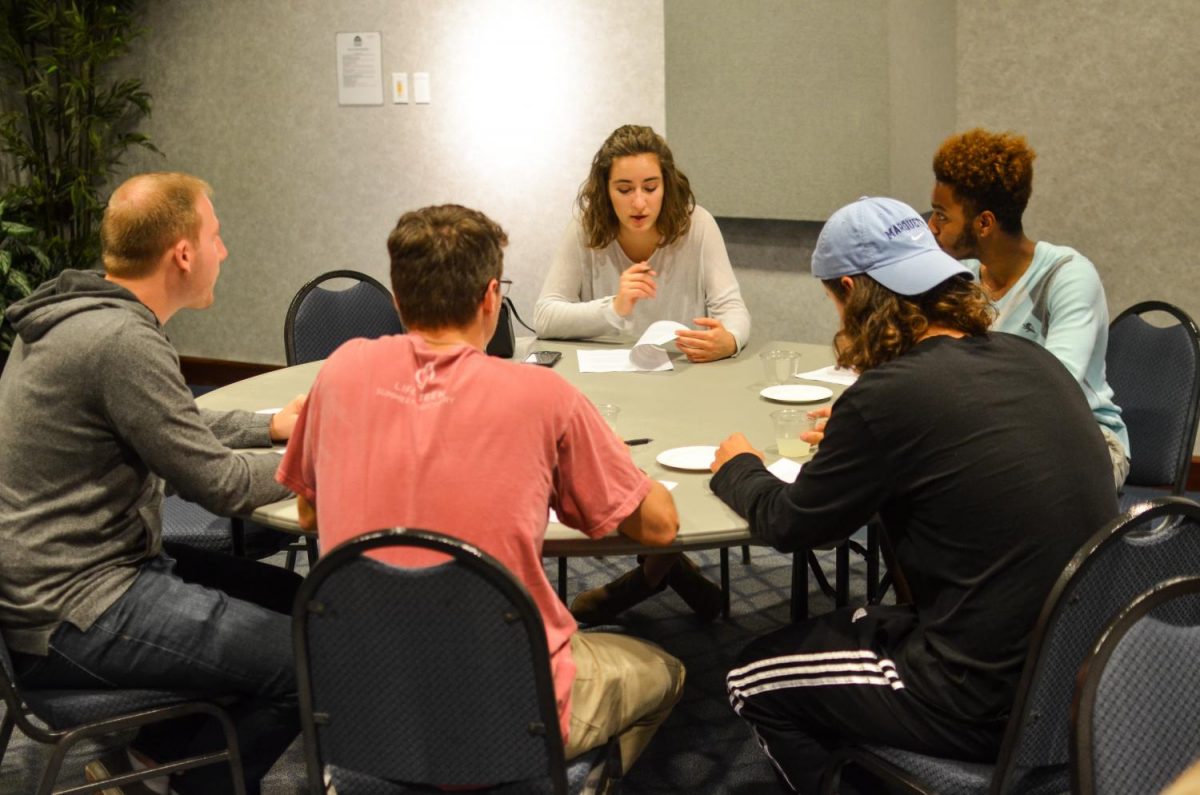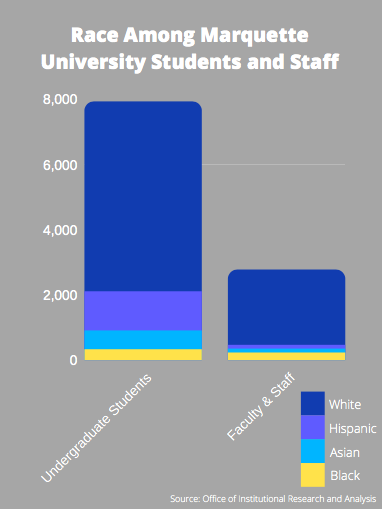The university will replace its University Core of Common Studies with its new Core Curriculum, making changes to theology and philosophy requirements and the introduction of over-arching themes to encompass part of students’ core experiences.
The current UCCS was implemented fall 2003, and review of the curriculum between the university and the Higher Learning Commission began in 2014. Then, in May 2015, University President Michael Lovell and Provost Dan Myers officially announced the revision process, according to the Core of Common Studies Revision website.
“One of the things we hear (about) the core is that it felt very disconnected,” Sarah Feldner, director of the university Core Curriculum, said. “(Students) really liked the mission base, they really like what Marquette is about, but that in terms of a clear path and understanding how the pieces built upon each other, that really isn’t there right now.”
The changes will begin fall 2018, with the new program consisting of 30 credits. The current UCCS is 36 credits, but because some core courses can count toward major requirements, Feldner said most students will complete around 33 strictly core credits.
The new core has three tiers: foundational courses, discovery courses and a culminating experience course. The new curriculum will only affect next year’s freshmen and consecutive classes.
The main credit difference can be found in the change from the current requirement of two theology courses to the new core’s requirement of one theology course.
For some students, such as Michael Church, a first-year graduate student in physician assistant studies, the two theology classes seemed to be a recap of classes he’d already taken in high school.
“I went to a Catholic high school and grade school, so I kind of knew everything already,” Church said.
Another change to the core is one philosophy course requirement rather than the current requirement of two. Whereas students now take “Philosophy of Human Nature” and a separate “Philosophy of Ethics,” future students will take a new course called “Thinking Philosophically.”
Rev. John D. Jones, professor and chair of the philosophy department who has been involved in the core revision process, said the newly-structured course will include elements from human nature and ethics, but is not a combination of the two. Students will be heavily encouraged to pose and explore their own philosophical questions and engage in discussion with their instructors and classmates. While a specific template is still being developed for the course, Jones said instructors will also have more flexibility regarding the content they teach.
Although there is a change in the requirement of two theology courses and two philosophy courses, students have room in the core to take these lost classes in a new theme-oriented tier of the curriculum.
The discovery tier of the curriculum requires students to choose a theme during sophomore or junior year to encompass four of their core courses. The current ten themes range from “Cities and Urbanization” to “Creativity and Technology.” The final six themes will be announced Oct. 1. Students and faculty have contributed to the theme ideas.
Ellery Kemner, a sophomore in the College of Business Administration, thinks choosing one theme can be limiting.
“I think having a well-rounded education at Marquette is very important, and choosing just one major topic almost narrows it,” she said.
Each theme will have between 30 and 40 courses for students to choose from, Feldner said. Students must take a humanities, social sciences, natural sciences & mathematics and elective course under their theme.
Since there is another humanities requirement and elective requirement in this tier, students can take another philosophy and theology course if they choose to.
“The department views both theology and philosophy as indispensable to the transformative project of Jesuit education. Consequently, any changes that could potentially reduce students’ exposure to these essential disciplines are concerning,” Conor Kelly, assistant professor in the theology department who has been involved in the core revision process, said in an email. “That said, the department recognizes that the revised core is moving away from a discipline-specific distribution model, so a change in the number of required courses does not necessarily mean that students will have less exposure to philosophy and theology.”
Jones said the new Core will help students connect their coursework. “I think the cumulative experience will help people begin to (form) what philosophers call the worldview: A way of understanding the world and the human place in it, both factually but also morally,” he said.
The singular humanity course requirement in the discovery tier makes students choose between taking a history, literature, theology or philosophy course, which could mean some students never take history or literature.
Another change from the current UCCS to the new core is the end of the diverse cultures requirement. Students are currently required to take one diverse cultures class, but the new core will consist of two “Engaging Social Systems and Values” requirements.
The classes will be smaller than diverse cultures classes tend to be, Feldner said. The aim is to create a conversation-based class environment where students can have discussions about larger issues.
“The move is to make these smaller so students really can practice (these skills) early on.”
The new Core will also introduce a “Methods of Inquiry” course, which will consist of three faculty members from different disciplines approaching a single topic.
“They’ll all talk about how their disciplines approach that (topic),” Feldner said. “To understand anything in our world, no single discipline can do it for us.”
A culminating class will be added to the new core as well. This course, called “Service of Faith and Promotion of Justice,” would be taken toward the end of a student’s core education and will include elements of theology and philosophy.
Despite the shifting roadmap of class requirements, Feldner said the new core still adheres to the university’s Jesuit tradition and gives students a way to connect what they learn.
“This is a still a very humanities-heavy liberal arts tradition, so that is unchanged. (But) it is using different courses to fulfill it,” she said. “Rather than a bingo sheet of ‘take this, take this, take this,’ hopefully we’re providing some choices and some pathways.”



Smithk901 • Jan 9, 2018 at 12:47 am
I was just seeking this info for some time. After six hours of continuous Googleing, at last I got it in your web site. I wonder what is the lack of Google strategy that don’t rank this kind of informative websites in top of the list. Generally the top sites are full of garbage. fbdkfegegcgfeege
Alumnus • Dec 14, 2017 at 8:06 pm
“The singular humanity course requirement in the discovery tier makes students choose between taking a history, literature, theology or philosophy course, which could mean some students never take history or literature.”
I look forward to picking up the phone the next time I get hit up for a donation, because so long as this is the case, Marquette is never seeing a dime from me!